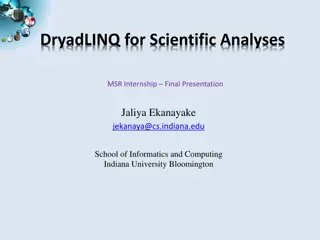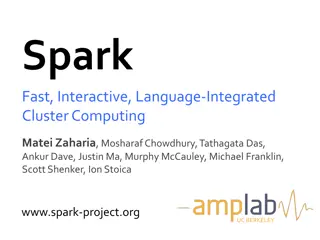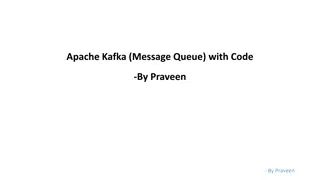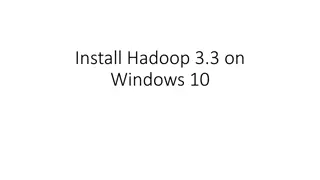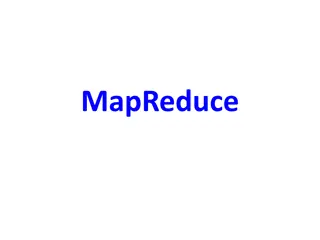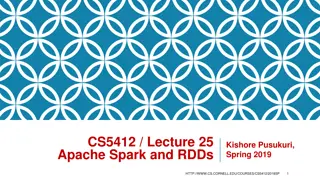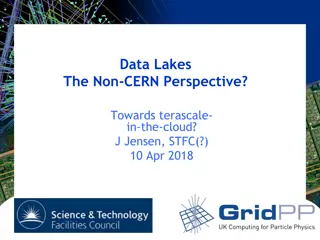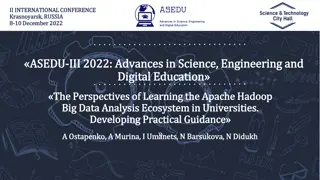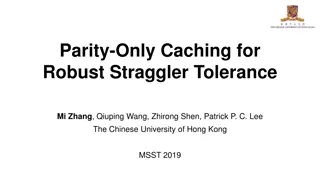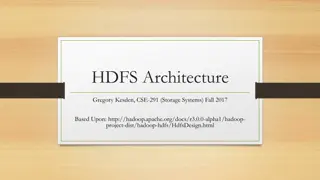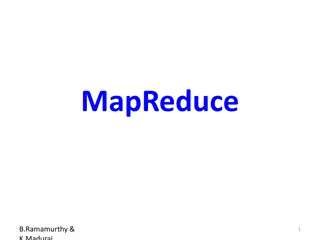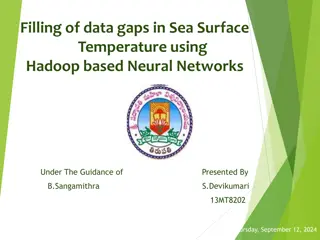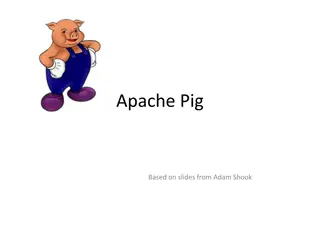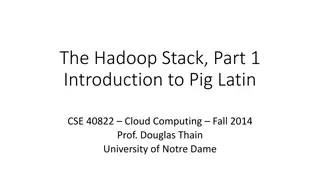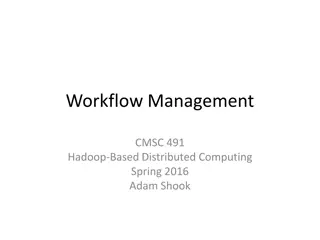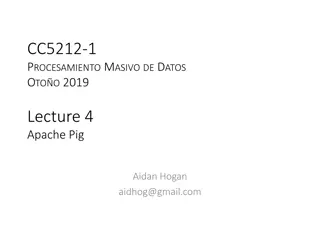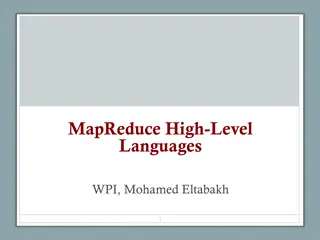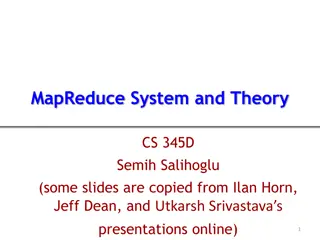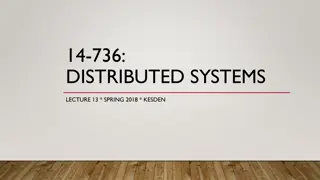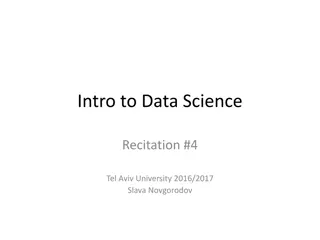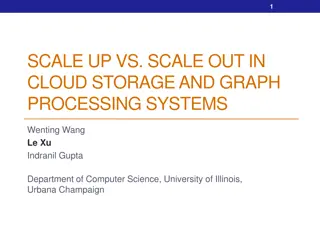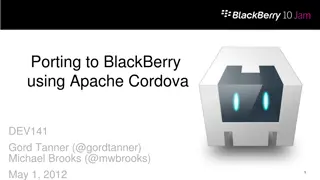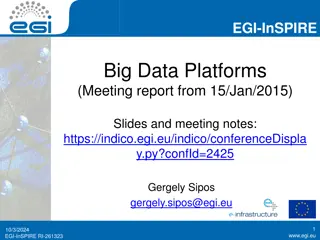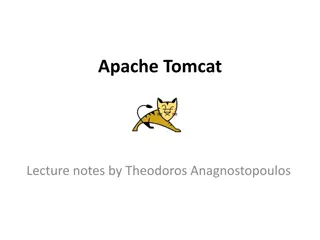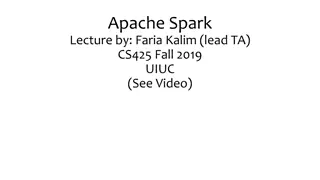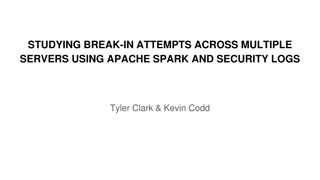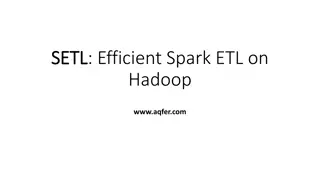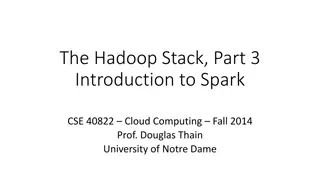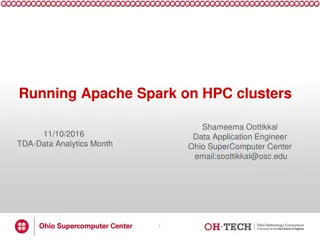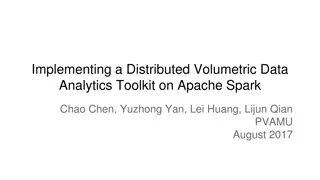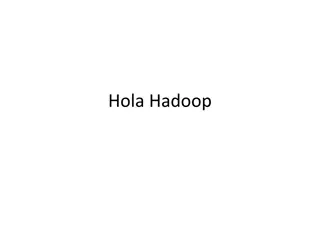Apache MINA: High-performance Network Applications Framework
Apache MINA is a robust framework for building high-performance network applications. With features like non-blocking I/O, event-driven architecture, and enhanced scalability, MINA provides a reliable platform for developing multipurpose infrastructure and networked applications. Its strengths lie i
3 views • 13 slides
Evaluation of DryadLINQ for Scientific Analyses
DryadLINQ was evaluated for scientific analyses in the context of developing and comparing various scientific applications with similar MapReduce implementations. The study aimed to assess the usability of DryadLINQ, create scientific applications utilizing it, and analyze their performance against
0 views • 20 slides
Understanding Apache Spark: Fast, Interactive, Cluster Computing
Apache Spark, developed by Matei Zaharia and team at UC Berkeley, aims to enhance cluster computing by supporting iterative algorithms, interactive data mining, and programmability through integration with Scala. The motivation behind Spark's Resilient Distributed Datasets (RDDs) is to efficiently r
0 views • 41 slides
Understanding Apache Kafka: A Messaging System Overview
Apache Kafka is a powerful software platform that facilitates data exchange between applications, servers, and processors through a distributed streaming process. Originally developed by LinkedIn and now maintained by Confluent under the Apache Software Foundation, Kafka serves as a robust message s
1 views • 29 slides
Tutorial: Installing Hadoop 3.3 on Windows 10 and Setting Up Linux Subsystem
Learn how to install Hadoop 3.3 on Windows 10 by enabling Windows Subsystem for Linux, downloading and configuring Java 8, downloading Hadoop, unzipping Hadoop binary, configuring SSH, and setting up Hadoop on your system.
1 views • 17 slides
Understanding MapReduce and Hadoop: Processing Big Data Efficiently
MapReduce is a powerful model for processing massive amounts of data in parallel through distributed systems like Apache Hadoop. This technology, popularized by Google, enables automatic parallelization and fault tolerance, allowing for efficient data processing at scale. Learn about the motivation
2 views • 33 slides
Spark: Revolutionizing Big Data Processing
Learn about Apache Spark and RDDs in this lecture by Kishore Pusukuri. Explore the motivation behind Spark, its basics, programming, history of Hadoop and Spark, integration with different cluster managers, and the Spark ecosystem. Discover the key ideas behind Spark's design focused on Resilient Di
0 views • 59 slides
Exploring Data Lakes and Cloud Analytics in Research
Delve into the realm of data lakes and cloud analytics through a non-CERN perspective, focusing on terascale data processing in the cloud. Learn about traditional data workflows, analysis tools like R and Jupyter notebooks, and the limits of in-memory processing. Get insights on Hadoop, data lakes,
0 views • 31 slides
Perspectives on Learning Apache Hadoop for Big Data Analysis in Universities
Analyzing Big Data processing technologies and providing practical guidance on installing and working with Apache Hadoop for its application in universities. Big Data technologies offer solutions in various economic sectors, making knowledge of Apache Hadoop essential for students. Launching the Had
0 views • 7 slides
Parity-Only Caching for Robust Straggler Tolerance in Large-Scale Storage Systems
Addressing the challenge of stragglers in large-scale storage systems, this research introduces a Parity-Only Caching scheme for robust straggler tolerance. By combining caching and erasure coding techniques, the aim is to mitigate latency variations caused by stragglers without the need for accurat
0 views • 29 slides
Overview of HDFS Architecture
HDFS (Hadoop Distributed File System) is designed for handling large data sets across commodity hardware. It emphasizes throughput over latency and is well-suited for batch processing applications. The architecture includes components like NameNode (master) and DataNode (participants), focusing on s
0 views • 15 slides
Understanding MapReduce in Distributed Systems
MapReduce is a powerful paradigm that enables distributed processing of large datasets by dividing the workload among multiple machines. It tackles challenges such as scaling, fault tolerance, and parallel processing efficiently. Through a series of operations involving mappers and reducers, MapRedu
7 views • 32 slides
Enhancing Sea Surface Temperature Data Using Hadoop-Based Neural Networks
Large-scale sea surface temperature (SST) data are crucial for analyzing vast amounts of information, but face challenges such as data scale, system load, and noise. A Hadoop-based Backpropagation Neural Network framework processes SST data efficiently using a Backpropagation algorithm. The system p
2 views • 24 slides
Introduction to Apache Pig: A High-level Overview
Apache Pig is a data flow language developed by Yahoo! and is a top-level Apache project that enables non-Java programmers to access and analyze data on a cluster. It interprets Pig Latin commands to generate MapReduce jobs, simplifying data summarization, reporting, and querying tasks. Pig operates
0 views • 57 slides
Introduction to Pig Latin for Data Processing in Hadoop Stack
Pig Latin is a dataflow language and execution system that simplifies composing workflows of multiple Map-Reduce jobs. This system allows chaining together multiple Map-Reduce runs with compact statements akin to SQL, optimizing the order of operations for efficiency. Alongside Pig Latin, the Hadoop
0 views • 20 slides
Introduction to Apache Oozie Workflow Management in Hadoop
Apache Oozie is a scalable, reliable, and extensible workflow scheduler system designed to manage Apache Hadoop jobs. It facilitates the coordination and execution of complex workflows by chaining actions together, running jobs on a schedule, handling pre and post-processing tasks, and retrying fail
0 views • 24 slides
Processing Big Data with Apache Pig in Hadoop Ecosystem
Explore how Apache Pig can be utilized in the Hadoop ecosystem to process large-scale data efficiently. Learn about concepts such as handling multiple inputs, job chaining, setting reducers, and utilizing a distributed cache. Compare Hadoop with SQL and understand why SQL might not be suitable for l
0 views • 78 slides
Understanding High-Level Languages in Hadoop Ecosystem
Explore MapReduce and Hadoop ecosystem through high-level languages like Java, Pig, and Hive. Learn about the levels of abstraction, Apache Pig for data analysis, and Pig Latin commands for interacting with Hadoop clusters in batch and interactive modes.
0 views • 27 slides
Understanding MapReduce System and Theory in CS 345D
Explore the fundamentals of MapReduce in this informative presentation that covers the history, challenges, and benefits of distributed systems like MapReduce/Hadoop, Pig, and Hive. Learn about the lower bounding communication cost model and how it optimizes algorithm for joins on MapReduce. Discove
0 views • 60 slides
Overview of Distributed Systems, RAID, Lustre, MogileFS, and HDFS
Distributed systems encompass a range of technologies aimed at improving storage efficiency and reliability. This includes RAID (Redundant Array of Inexpensive Disks) strategies such as RAID levels, Lustre Linux Cluster for high-performance clusters, MogileFS for fast content delivery, and HDFS (Had
0 views • 23 slides
Mathematical Modeling for Psychiatric Diagnosis in Big Data Environment
This research project led by Prof. Kazuo Ishii aims to develop a Big Data mining method and optimized algorithms for genomic Big Data, specifically targeting three major mental disorders including depression. The research process involves data analytics, mathematical modeling, and data processing te
0 views • 21 slides
Apache Traffic Control Update Highlights
Apache Traffic Control provides insights into recent changes and upcoming developments, including Traffic Router updates, DNSSEC implementation, monitoring changes, and roadmap fixes. Stay informed about the project's progress and future plans.
0 views • 8 slides
Introduction to MapReduce Paradigm in Data Science
Today's lesson covered the MapReduce paradigm in data science, discussing its principles, use cases, and implementation. MapReduce is a programming model for processing big data sets in a parallel and distributed manner. The session included examples, such as WordCount, and highlighted when to use M
0 views • 48 slides
Overview of Installing Apache Tomcat Server
Learn about the process of installing Apache Tomcat server for running web applications over the Internet. This guide covers the components of a web application, the role of HTTP protocol, and details about Apache Tomcat as a Java-capable HTTP server. Follow step-by-step instructions for downloading
0 views • 25 slides
The Art of Logging: An Exploration with Apache Log4j 2 by Gary Gregory
Delve into the world of logging with Apache Log4j 2 through the insightful exploration presented by Gary Gregory, a Principal Software Engineer at Rocket Software. Discover the importance of logging, key concepts like logging architecture and APIs, and the significance of modern logging frameworks s
0 views • 72 slides
Comparing Scale-Up vs. Scale-Out in Cloud Storage and Graph Processing Systems
In this study, the authors analyze the dilemma of scale-up versus scale-out for cloud application users. They investigate whether scale-out is always superior to scale-up, particularly focusing on systems like Hadoop. The research provides insights on pricing models, deployment guidance, and perform
0 views • 27 slides
Porting to BlackBerry using Apache Cordova - Development Insights
Explore the process of porting to BlackBerry using Apache Cordova as shared by Gord Tanner and Michael Brooks. Discover tips on overcoming challenges, ensuring compatibility, and leveraging HTML5 for a smoother transition to the BlackBerry platform.
0 views • 25 slides
Big Data Platforms: Meeting Report and Insights
The meeting report from the EGI-InSPIRE Big Data Platforms highlights presentations on various topics including DBSCAN algorithm, Hecuba integration with COMPSs, cloud infrastructure development, and Hadoop clusters instantiation. The outcomes emphasize the interest in further discussions, opportuni
0 views • 4 slides
Preliminary Steps in Setting Up a Hadoop Environment
Logging into the VM, changing passwords, transferring files to Hadoop, setting up Rstudio for MapReduce programming, and running the first MapReduce program are essential preliminary steps in establishing a Hadoop environment for data processing tasks.
0 views • 13 slides
Overview of Big Data Security in Modern Computing Environments
Big data security is a crucial aspect in today's computing landscape, especially with the increasing reliance on cloud computing and distributed frameworks like Hadoop. This overview covers key topics such as data classification, Hadoop security mechanisms, and challenges in securing the Hadoop Dist
0 views • 61 slides
Understanding Apache Tomcat: An Open Source Implementation of Java Servlet and JSP Technologies
Apache Tomcat is an open-source software implementing Java Servlet and JavaServer Pages technologies. It is developed under the Java Community Process and released under the Apache License version 2. Apache Tomcat powers large-scale web applications and is a collaboration of developers worldwide. Le
0 views • 6 slides
Introduction to Apache Spark: Simplifying Big Data Analytics
Explore the advantages of Apache Spark over traditional systems like MapReduce for big data analytics. Learn about Resilient Distributed Datasets (RDDs), fault tolerance, and efficient data processing on commodity clusters through coarse-grained transformations. Discover how Spark simplifies batch p
0 views • 17 slides
Analyzing Break-In Attempts Across Multiple Servers using Apache Spark
Exploring cyber attacks on West Chester University's servers by analyzing security logs from five online servers using Apache Spark for large-scale data analysis. Uncovering attack types, frequency patterns, and sources to enhance security measures. Discover insights on break-in attempts and potenti
0 views • 19 slides
Efficient Spark ETL on Hadoop: SETL Approach
An overview of how SETL offers an efficient approach to Spark ETL on Hadoop, focusing on reducing memory footprint, file size management, and utilizing low-level file-format APIs. With significant performance improvements, including reducing task hours by 83% and file count by 87%, SETL streamlines
0 views • 17 slides
Introduction to Spark in The Hadoop Stack
Introduction to Spark, a high-performance in-memory data analysis system layered on top of Hadoop to overcome the limitations of the Map-Reduce paradigm. It discusses the importance of Spark in addressing the expressive limitations of Hadoop's Map-Reduce, enabling algorithms that are not easily expr
0 views • 16 slides
Understanding Apache Spark: A Comprehensive Overview
Apache Spark is a powerful open-source cluster computing framework known for its in-memory analytics capabilities, contrasting Hadoop's disk-based paradigm. Spark applications run independently on clusters, coordinated by SparkContext. Resilient Distributed Datasets (RDDs) form the core of Spark's d
0 views • 16 slides
Distributed Volumetric Data Analytics Toolkit on Apache Spark
This paper discusses the challenges, methodology, experiments, and conclusions of implementing a distributed volumetric data analytics toolkit on Apache Spark to address the performance of large distributed multi-dimensional arrays on big data analytics platforms. The toolkit aims to handle the expo
0 views • 33 slides
Comprehensive Guide to Setting Up Apache Spark for Data Processing
Learn how to install and configure Apache Spark for data processing with single-node and multiple-worker setups, using both manual and docker approaches. Includes steps for installing required tools like Maven, JDK, Scala, Python, and Hadoop, along with testing the Wordcount program in both Scala an
0 views • 53 slides
Overview of Delta Lake, Apache Spark, and Databricks Pricing
Delta Lake is an open-source storage layer that enables ACID transactions in big data workloads. Apache Spark is a unified analytics engine supporting various libraries for large-scale data processing. Databricks offers a pricing model based on DBUs, providing support for AWS and Microsoft Azure. Ex
0 views • 16 slides
Important Safety Measures for Handling Data on Hadoop Cluster
Implementing critical clean-up procedures, warning against potential dangers, and emphasizing the need for caution when performing tasks on the Hadoop cluster. The guide stresses the importance of data integrity and proper handling techniques to ensure the smooth functioning of the system.
0 views • 22 slides

